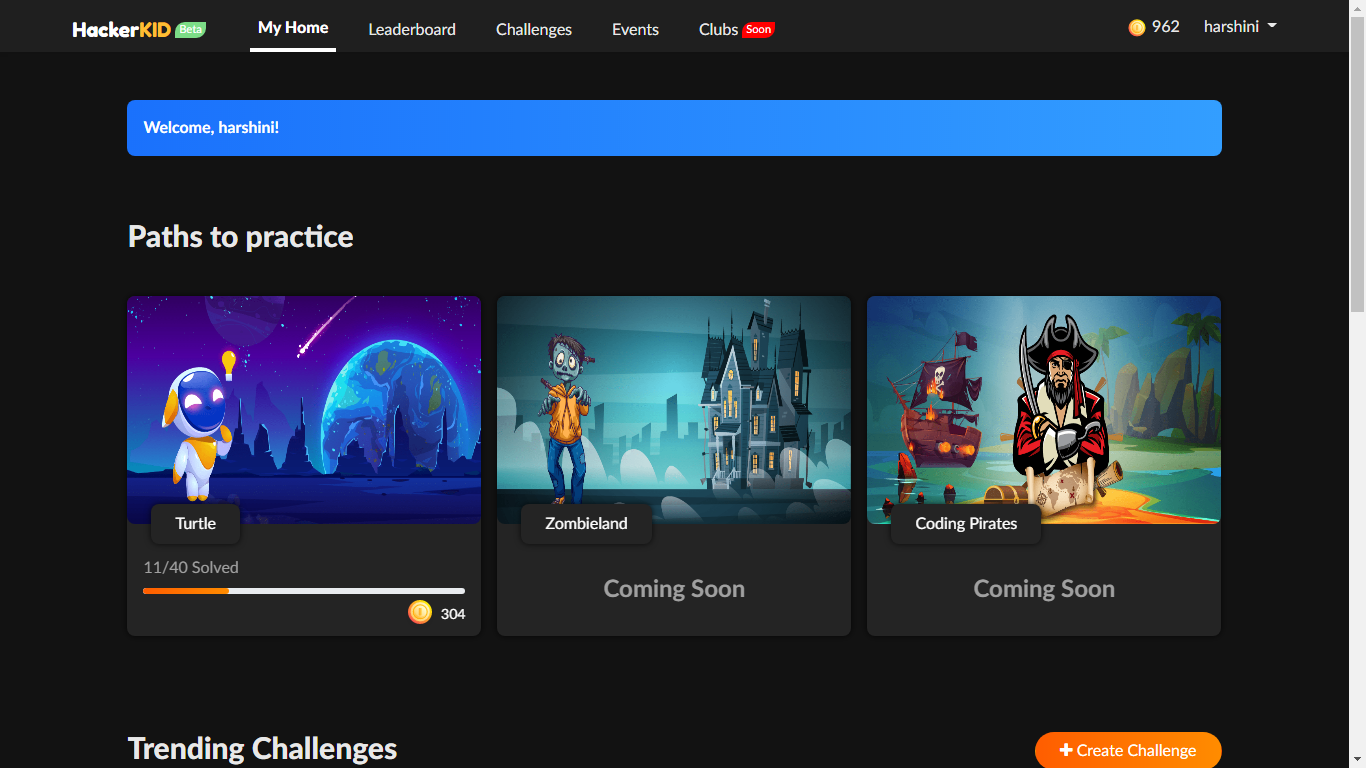IIT-Madras Incubated Startup Develops India’s First ‘Gamified Coding Platform’ for Kids
Chennai: IIT Madras-incubated startup GUVI has developed India’s first ‘Gamified Coding Platform’ called ‘HackerKID,’ which aims to teach coding for kids using a game-based environment. The Startup worked with more than 1,200 kids from the Netherlands, the U.S., Australia and India while developing the product features and designs for HackerKID.
The children are introduced to ‘Block-Based Programming’ in HackerKID and provided with a virtual playground to practice challenges. Block-based Programming is an easy and powerful way to develop software. The ‘drag and drop’ of blocks or chunks of coding instructions make it simpler for kids, when compared to conventional classroom teaching, to learn the foundations of programming flow and computational thinking.
GUVI is an integrated ed-tech platform in vernacular language, which has a deep penetration in India with a presence in over 1,000 engineering colleges. It has already upskilled more than 4.6 lakh engineers in latest technology skills such as Python, Java and Machine Learning, among others and help them gain placement in IT firms.
The beginner’s level of ‘Turtle Module’ is being offered free of cost and features points, rewards, badges for each activity in block-based programming and showcases the kid’s creativity to fellow learners through a leaderboard. The ‘Turtle’ module prepares kids for the ‘International Block Coding Olympiad’ which is scheduled to be held shortly.
Highlighting the unique aspects of ‘HackerKID,’ Mr. S.P. Balamurugan, Co-founder and Chief Executive Officer, GUVI, said, “Although learning to code has its amazing advantages among young minds, it is not easy for kids to assimilate the concepts of Computer Science. Also, there exists a real tussle to draw their attention and to develop an interest in them with conventional text-based coding. For this very reason, HackerKID serves as the platform for kids to start their journey in coding.”
Further, Mr. Balamurugan said, “HackerKID is the first product launched in India as a platform for extensive coding practice utilizing block-based programming with a game-based environment specially designed for kids, where coding is fun. The current players in the market who teach coding are failing in the ‘practise’ part, which is essential to learn Coding. HackerKid fulfils that need for kids who want to learn coding.”
Registrations are now made open to the public. Parents can sign-up at http://www.hackerkid.org and experience the platform along with their kids. Bulk registrations for schools are also facilitated free of cost. Requests can be sent to [email protected]
Unlike the traditional text-based coding classroom approach, the gaming style with the ‘play-to-code’ method would enable children to master the flow in programming. The ‘Challenges’ segment enables kids to create and share problems with fellow learners to solve. Whether to be an individual performer or an active group member is a choice made by the student. As the modules are aligned with the academic curriculum for grades, it is easy for the kids to relate what they learn with what they play.
Elaborating on the unique advantages of ‘HackerKID,’ Mr. Arun Prakash, Founder and Chief Technical Officer, GUVI, said, “By practicing in HackerKID, children can understand the coding world in a better way by attaining skills such as problem-solving, creative thinking, persistence, communication and collaboration. The illustrations, UX design, and experience has been developed along with kids themselves, which makes them love the product. The ‘Turtle Module’ is free for everyone to learn and practice while ‘Zombie Land’ and ‘Coding Pirates’ are the fine-tuning phases to amuse the learners. More than 20 new features involving languages such as HTML, CSS and JavaScript are in cooking and will be launched soon.”
HackerKid provides major takeaways to children according to age group. Feedback from some of the students who took part in the development stage has been shared:
Ø Age 9 to 11: A pre-teen phase always seeks to build a peer group to play along with. The COVID-19 era has created a feeling of loneliness in kids. HackerKID would be a boon when learning happens while playing online with fellow coders by challenging them.
Mr. Kapish Agarwal, Class V, Delhi Public School, Varanasi: “The best part of HackerKID is the free trial with many questions packed in one game.”
Mr. Anvi Singh, Class VII, Saraswathi International School, Valsad: “I tried HackerKID that turned into a fun and marvelous learning. The most fun part is that we can challenge the other participants and compete with them.”
Ø Age 12-14: With the skills and right tools, Innovation becomes a key for development at this age. For that, learning agility is quite important and this joy-packed game will give a massive boost.
Mr. Karan Easwar, Class VIII, Vellamal Vidyalaya Main Campus, Melayanambakkam, Chennai: “I have a passion for creating gaming apps and coding is the right way for app creation…. HackerKID made it easy with its hints and instructions while the leaderboard makes me competitive and enthusiastic.”
Kids and parents can get regular updates on HackerKid at their Instagram page – @hackerkid_org
Children can share their game level results with #hackerkid to grab exciting offers on upcoming games such as ‘Zombie land’ and ‘Coding Pirates.’ Those interested can pre-register in the ‘Events’ section and stand a chance to win a ‘Miko Robot’ worth Rs. 25,000.
GUVI, which offers an online platform for students to learn in their mother tongues, is offering specialized courses to upskill students and make them ‘job ready’ without having to leave their house. The mission of GUVI is to take technology skills to all the deserving students and ensure demography is never a barricade to acquire skills. Towards this, GUVI offers technology skills that are in-demand in the industry in regional languages such as Tamil, Telugu, Kannada, Hindi, Bengali besides English. GUVI is transforming lives by offering tech skills in the language, which the students are familiar throughout their life and is bridging the gap between academia and industry.

